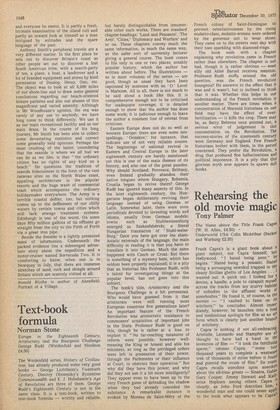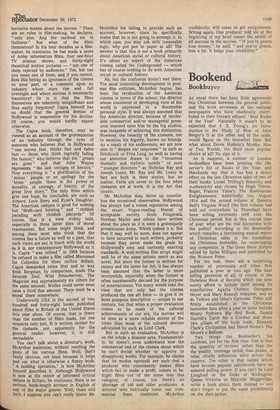Rehearsing the old movie magic
Tony Palmer
The Name above the Title Frank Capra (W. H. Allen, £4.50) • Underworld USA Colin McArthur (Secker and Warburg £2.20)
Frank Capra's is a giant book about giant subject, not Capra himself, but Hellywood. "I hated being poor," he begins. "Hated being a peasant. Hated being a scrounging newskid trapped in the sleazy Sicilian ghetto of Los Angeles . . 1 wanted out. A quick out. I looked for 8, device, a handle, a pole to catapult myself across the tracks from my scurvy habitat of nobodies to the affluent world 01 somebodies." He found it, of course, in the movies — "I vaulted to fame on its witchery," he concludes. Almost imme' diately, however, he launches into a long and tendentious apologia for film as an art form which is clearly just another branch of witchery.
Capra is nothing if not all-embracing. Aristotle, Leonardo and Stampfer are all thought to have had a hand in the invention of film — "it took the fertilising sperm," intones Capra, "some foUr thousand years to complete a westward, trek of thousands of miles before it fount' and pierced the ovum of film." En route, Capra recalls anecdote upon anecdote about the all-time greats — Sinatra, Gable' Gary Cooper, Jimmy Stewart and Kath' erine Hepburn among others. Capra le clearly, as John Ford describes him, e wonderful man and one could never apPI,Y to the book what appears to be Capra e favourite maxim about the movies. "There are no rules in film-making, he declares, "only sins. And the cardinal sin is Dullness." But what of the films themselves? In his four decades as a filmmaker, he maintains, he has made a score of Army information films, four one-hour TV science shows, and thirty-eight theatrical motion pictures — "not one of them rejected by audiences." Yes, but can you name one of them, and if you cannot, , does this betray an ignorance of the cinema on your part, or a comment upon an industry where stars rise and fall overnight and where success is necessarily transitory? Or is it that the films themselves are relatively insignificant and thus easily forgotten? Capra himself has no doubt that the general demise of Hollywood is responsible for his decline. Of course, you would hardly expect otherwise.
The Capra book, therefore, may be viewed as an account of the grotesqueries of an industry through the eyes of someone who believes that in Hollywood "one moves fast, thinks fast and fades fast — those who think logically fading the fastest," who believes that the "greats are gone" and that John Wayne represents "the last vestiges of heroics." Now everything is "a glorification of the ' minus ' people or an apology for the brute' people. Gone is the power of morality, of courage, of beauty, of the great love story." The only films which give one hope, he concludes, are such as Airport, Love Story and Ryan's Daughter. The American campus is good for nothing but "draft-card burning" and "childish parading with childish placards." Of course, that is a view widely held, especially in these latter days of moral rearmament. But some might think, and among them most who think that the cinema has a future as well as a past, that such views are not in touch with the world, as it is, nor contemporary Hollywood as it is. Capra "was retired" in 1964 because he refused to make a film called Marooned for Columbia for three million dollars. Capra demanded twice that and so was fired. Bergman, by comparison, made The Seventh Seal, Wild Strawberries, The Magician and approximately six others for the same amount. Welles could never even raise a third that amount. There must be a moral there somewhere.
Underworld USA is the second of two hundred and forty-eight books published about films in Britain or the United States this year alone. Of course, that is fewer than the number of films made, but one suspects only just. It is written neither for the cineaste, nor, apparently for the general reader: however, it is still unreadable.
You can't talk about a director's work, McArthur maintains, without retelling the Plots of his various films. Well, that's fairly obvious, not least because it helps Pad out what is otherwise a flimsy book. 'A holdirig operation," is how McArthur himself describes it. Although Hollywood iS now at the centre of informed critical debate in Britain, he continues, there is no serious, book-length account in English of any of the major genres. Well, there still isn't. I suppose you can't really blame Mr. McArthur for failing to provide such an account, however, since he specifically states that he is not going to attempt it. In which case, you may ask with inexorable logic, why put pen to paper at all? The answer is that this is not a book primarily about American social or cultural history. It's about an aspect of the American cinema called the Underground — which has of course nothing to do with American social or cultural history.
Ah, but the confusion doesn't end there. The most interesting development in postwar film criticism, McArthur begins, has been the revaluation of the American cinema in terms of the auteur, the director whose consistent or developing view of the world is expressed in a discernible personal style. It was always assumed that the American director, because of intolerable commercial and/or managerial pressures imposed upon him by the big studios, was incapable of achieving this distinction. However, the tenacity of the cineaste, not to mention his bigotry, knows no bounds. As a result of his endeavours, we are now able to "deepen our responses" to such as Hitchcock or Fritz Lang, as well as having our attention drawn to the "recurrent thematic and stylistic motifs" of such "younger directors" as Nicholas Ray and Joseph Losey. Mr. Ray and Mr. Losey in fact are both in their sixties, but no matter. Facts are never to the fore when cineastes are at work. It is the Art that counts.
Mr. McArthur does throw up nonetheless the occasional observation. Hollywood has always had a rotten reputation among the smart Vogue-reading literati of acceptable society. Scott Fitzgerald, Norman Mailer and others have written about the place as if it were a grotesquely promiscuous dump. Which indeed it is. But that it may well be more, does not appear to have occurred to such writers, probably because they never made the grade by Hollywood's own and curiously exacting standards. A well-written film script might well be of the same artistic •merit as any novel. But since the former is written for money and the latter for Art, it has always been assumed that the latter is more worthwhile, especially when the former is often unashamedly devised for the purpose of entertainment. Yet many would take the view that not only has the cinema produced the one art form — to give it its most pompous description — unique to our century, but that when a proper evaluation comes to be made of the cultural achievements of our era, the movies will be seen as a more reliable mirror of the times than most of the cultural devices advocated by such as Lord Clark.
But in such an evaluation, McArthur is on the whole a disaster area. Fundamentally, he doesn't even understand how the commercial end of the cinema about which he can't decide whether to approve or disapprove) works. For example, he claims that its modus operandi are such that a producer who consistently makes films which fail to make a profit, ceases to be. Eight films out of ten come into this category, of course, but there's no shortage of old and older producers. A director who habitually turns out commercial flops, continues McArthur confidently, will cease to get assignments. Wrong again. One producer told me at the beginning of my brief career the secret of all success in the movies. "If you're gonna lose money," he said, "and you're gonna, lose a lot. It helps your credibility."



































 Previous page
Previous page